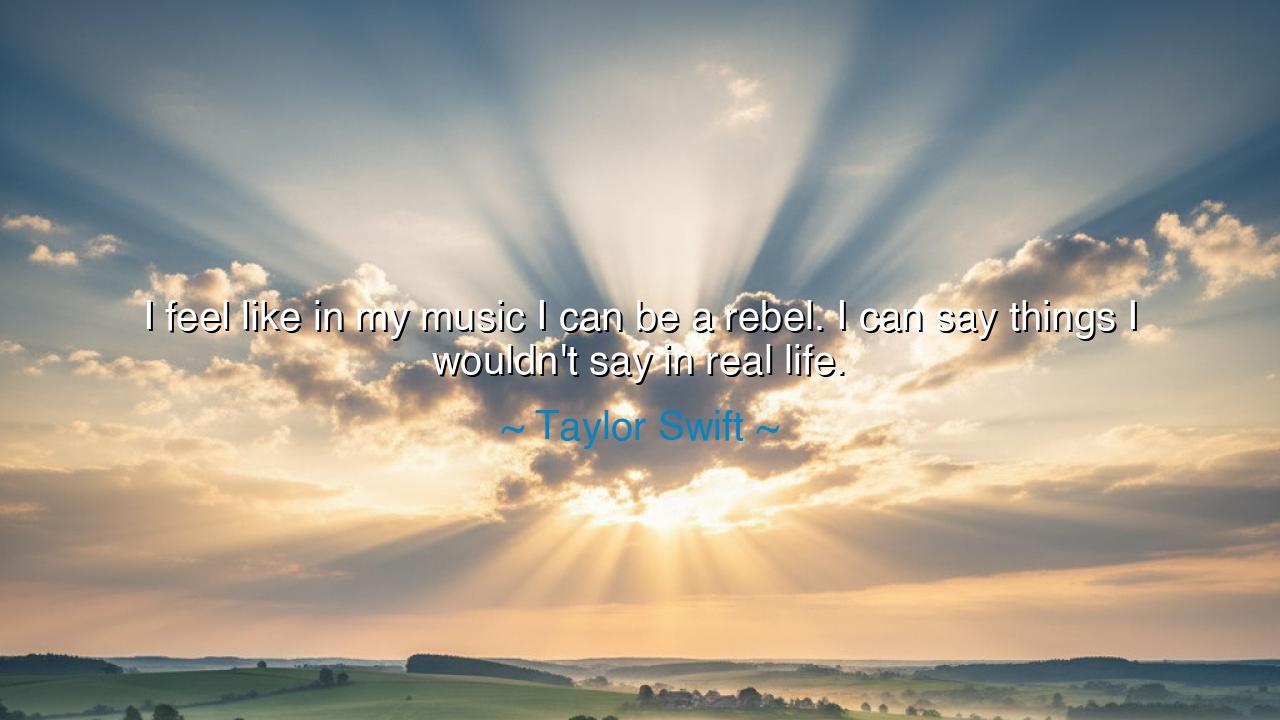
I feel like in my music I can be a rebel. I can say things I
I feel like in my music I can be a rebel. I can say things I wouldn't say in real life.






The words of Taylor Swift shimmer with both vulnerability and defiance: “I feel like in my music I can be a rebel. I can say things I wouldn't say in real life.” Here lies the essence of art as a sanctuary and a battlefield. For in the ordinary course of life, speech is bound by fear, by custom, by the invisible walls of society. But in music, chains are broken. The tongue hesitates, but the song dares. The self is constrained, but the melody sets it free. Thus, the artist finds within creation the courage denied to them in silence.
From the beginning of time, humanity has turned to song when the soul could no longer be contained. The ancients knew this truth well: warriors sang chants before battle to release their rage; mourners sang laments to bear grief too deep for words; lovers sang ballads to confess desires their lips could not utter in daylight. In every age, music has been rebellion against the unspeakable, a vessel for truths too sharp for ordinary speech. Swift’s words are but the modern echo of this eternal power.
Consider the psalms of David, shepherd and king, who poured into song his anger, his sorrow, his hope, his longing. Some of his words could never have been spoken in court or on the battlefield without scandal or danger. Yet in the sanctuary of music, he cried, “Why have you forsaken me?” and also, “My heart will sing to You forever.” These contradictions—rebellion and devotion, despair and triumph—were permitted in song. And through them, David’s humanity has spoken across millennia.
So too, in the modern age, rebellion in music has shaken empires. The folk songs of the oppressed in America carried messages of freedom when open speech was forbidden. The protest songs of the 1960s gave voice to generations who could not openly confront authority in daily life. Bob Dylan, Joan Baez, and countless others sang what they dared not otherwise declare: that war was madness, that justice was demanded, that change must come. Music gave them the strength to be rebels, even when their lives required silence.
Taylor Swift reveals the same truth in personal form. The things she would not say in life—the sharp retorts, the unspoken hurts, the confessions of desire, the righteous anger—she breathes into her songs. Through music, she rebels against restraint, against judgment, against the cages of expectation. And because her songs are born from honesty, millions listen and find their own secret voices echoed there. Her rebellion is not only for herself, but for those who cannot yet sing their truths.
The lesson here, O listener, is profound: art is not merely decoration but liberation. Music and all forms of expression can become sanctuaries where truth is spoken without fear. If you cannot say what weighs upon your heart, then sing it, write it, paint it, dance it. In creation, you will find the strength to reveal what daily life demands you conceal. Rebellion, in this sense, is not destruction but freedom—the act of giving your soul its true voice.
Practical wisdom follows: keep a journal, a melody, a canvas, a space where your unsaid truths may live. Do not wait for the courage of speech; instead, give your rebellion form in art. Share it if you dare, or guard it if you must. What matters is that your spirit has a channel. For the heart that remains silent too long becomes heavy, but the heart that sings is lightened, even if only in secret.
Thus remember: music is a rebellion of the soul, a safe place where truth wears no mask. Taylor Swift speaks for all who have ever felt small in the world but mighty in song. Follow this path, and you too shall discover freedom in the art you create, and courage in the truths you express. For while the tongue may falter, the song will always soar.






AAdministratorAdministrator
Welcome, honored guests. Please leave a comment, we will respond soon